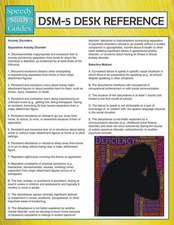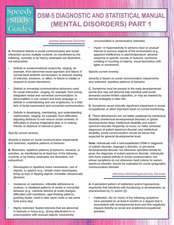The Neuropsychologist′s Roadmap – A Training and Career Guide
Autor Cady Blocken Limba Engleză Paperback – 21 iun 2021
Preț: 335.08 lei
Nou
Puncte Express: 503
Preț estimativ în valută:
64.14€ • 69.69$ • 53.91£
64.14€ • 69.69$ • 53.91£
Carte disponibilă
Livrare economică 31 martie-14 aprilie
Livrare express 15-21 martie pentru 37.56 lei
Preluare comenzi: 021 569.72.76
Specificații
ISBN-13: 9781433832987
ISBN-10: 1433832984
Pagini: 408
Dimensiuni: 152 x 228 x 21 mm
Greutate: 0.58 kg
Editura: Wiley
ISBN-10: 1433832984
Pagini: 408
Dimensiuni: 152 x 228 x 21 mm
Greutate: 0.58 kg
Editura: Wiley
Notă biografică
Cuprins
Contributors
Foreword. What It Means to Be a Neuropsychologist in an Evolving Field
Antonio E. Puente
Acknowledgments
Introduction. On Becoming a Neuropsychologist
Cady Block
Part I: Timeline for Training and Career Entry in Neuropsychology
Chapter 1. Applying and Getting Into Graduate School
Julie Suhr, Steven Paul Woods, Claire Alexander, and Michelle Babicz
Chapter 2. Preparing for and Obtaining a Predoctoral Internship in Neuropsychology
Emily Kellogg, Brittany Cerbone, Laura Kenealy, and Robert Collins
Chapter 3. Preparing for and Obtaining a Postdoctoral Fellowship
Douglas Bodin
Chapter 4. Professional Licensure and Credentialing
Joseph Ackerson and Cady Block
Chapter 5. Board Certification in Neuropsychology
Christopher Grote, Jason R. Soble, and Adeline León
Chapter 6. Finding a Job: Clinical Careers in Neuropsychology
Heather G. Belanger, Jason R. Soble, Edward Peck III, Patrick Armistead-Jehle, Mark Barisa, Lucien Roberts III, and Mike R. Schoenberg
Chapter 7. Finding a Job: Research Careers in Neuropsychology
Yana Suchy and Matthew J. Euler
Part II: Foundational Competencies in Neuropsychology
Chapter 8. Training, Education, and Competencies in Neuropsychology
Brad Roper and Scott Sperling
Chapter 9. Classroom Teaching and Clinical Supervision Competencies
Leslie Guidotti Breting and Douglas M. Whiteside
Chapter 10. Consultation, Assessment, and Intervention Competencies
Amy Heffelfinger and Julie Janecek
Chapter 11. Neuroanatomy Training and Competencies
Michael Parsons and Cady Block
Chapter 12. Research Development and Dissemination Competencies
Derin Cobia, Dalin Pulsipher, and Cady Block
Chapter 13. Research Awards and Grantsmanship Competencies
Stephanie Kielb and Cady Block
Chapter 14. Ethics, Legal Standards, and Policy in Neuropsychology
Dede Ukueberuwa, Christopher Nguyen, and Daniel Tranel
Chapter 15. Individual and Cultural Diversity Competencies
Christopher Nguyen, Octavio Santos, and Daryl Fujii
Chapter 16. Self-Care and Work–Life Integration Competencies
Laura Flashman and Robin Hilsabeck
Chapter 17. Mentorship in Clinical Neuropsychology
C. Munro Cullum, Shawn McClintock, and Laura Lacritz
Chapter 18. Interdisciplinary Science, Practice, and Education Competencies
Joanne Festa and Christina A. Palmese
Chapter 19. Leadership Development Competencies
Cynthia S. Kubu
Chapter 20. Advocacy Competencies
Scott A. Sperling, Beth C. Arredondo, Stephanie D. Bajo, and Lucas D. Driskell
Index
About the Editor
Foreword. What It Means to Be a Neuropsychologist in an Evolving Field
Antonio E. Puente
Acknowledgments
Introduction. On Becoming a Neuropsychologist
Cady Block
Part I: Timeline for Training and Career Entry in Neuropsychology
Chapter 1. Applying and Getting Into Graduate School
Julie Suhr, Steven Paul Woods, Claire Alexander, and Michelle Babicz
Chapter 2. Preparing for and Obtaining a Predoctoral Internship in Neuropsychology
Emily Kellogg, Brittany Cerbone, Laura Kenealy, and Robert Collins
Chapter 3. Preparing for and Obtaining a Postdoctoral Fellowship
Douglas Bodin
Chapter 4. Professional Licensure and Credentialing
Joseph Ackerson and Cady Block
Chapter 5. Board Certification in Neuropsychology
Christopher Grote, Jason R. Soble, and Adeline León
Chapter 6. Finding a Job: Clinical Careers in Neuropsychology
Heather G. Belanger, Jason R. Soble, Edward Peck III, Patrick Armistead-Jehle, Mark Barisa, Lucien Roberts III, and Mike R. Schoenberg
Chapter 7. Finding a Job: Research Careers in Neuropsychology
Yana Suchy and Matthew J. Euler
Part II: Foundational Competencies in Neuropsychology
Chapter 8. Training, Education, and Competencies in Neuropsychology
Brad Roper and Scott Sperling
Chapter 9. Classroom Teaching and Clinical Supervision Competencies
Leslie Guidotti Breting and Douglas M. Whiteside
Chapter 10. Consultation, Assessment, and Intervention Competencies
Amy Heffelfinger and Julie Janecek
Chapter 11. Neuroanatomy Training and Competencies
Michael Parsons and Cady Block
Chapter 12. Research Development and Dissemination Competencies
Derin Cobia, Dalin Pulsipher, and Cady Block
Chapter 13. Research Awards and Grantsmanship Competencies
Stephanie Kielb and Cady Block
Chapter 14. Ethics, Legal Standards, and Policy in Neuropsychology
Dede Ukueberuwa, Christopher Nguyen, and Daniel Tranel
Chapter 15. Individual and Cultural Diversity Competencies
Christopher Nguyen, Octavio Santos, and Daryl Fujii
Chapter 16. Self-Care and Work–Life Integration Competencies
Laura Flashman and Robin Hilsabeck
Chapter 17. Mentorship in Clinical Neuropsychology
C. Munro Cullum, Shawn McClintock, and Laura Lacritz
Chapter 18. Interdisciplinary Science, Practice, and Education Competencies
Joanne Festa and Christina A. Palmese
Chapter 19. Leadership Development Competencies
Cynthia S. Kubu
Chapter 20. Advocacy Competencies
Scott A. Sperling, Beth C. Arredondo, Stephanie D. Bajo, and Lucas D. Driskell
Index
About the Editor
Descriere
With contributions by more than 40 experts in the field, this comprehensive text details the steps necessary to build a career in neuropsychology and outlines the core competencies students and trainees must master along the way.















